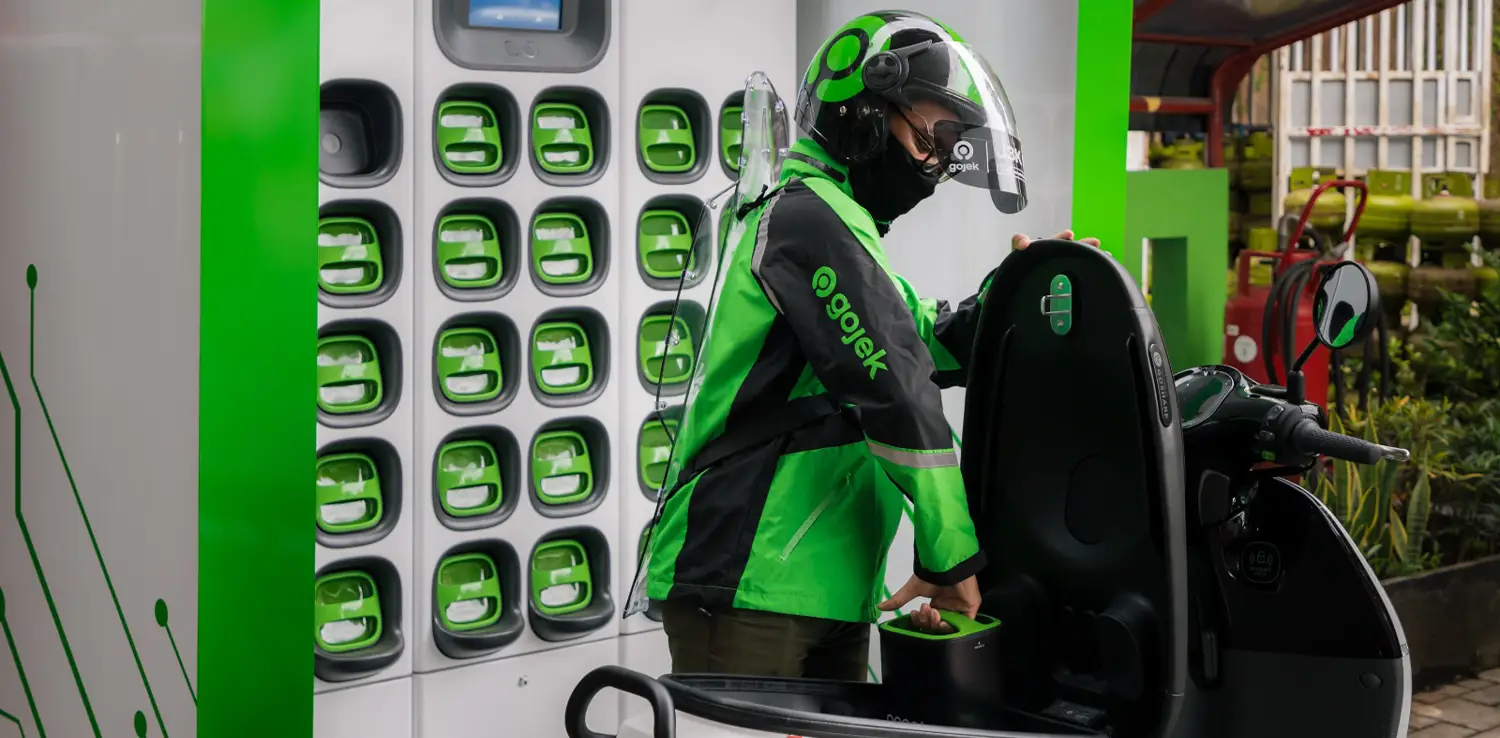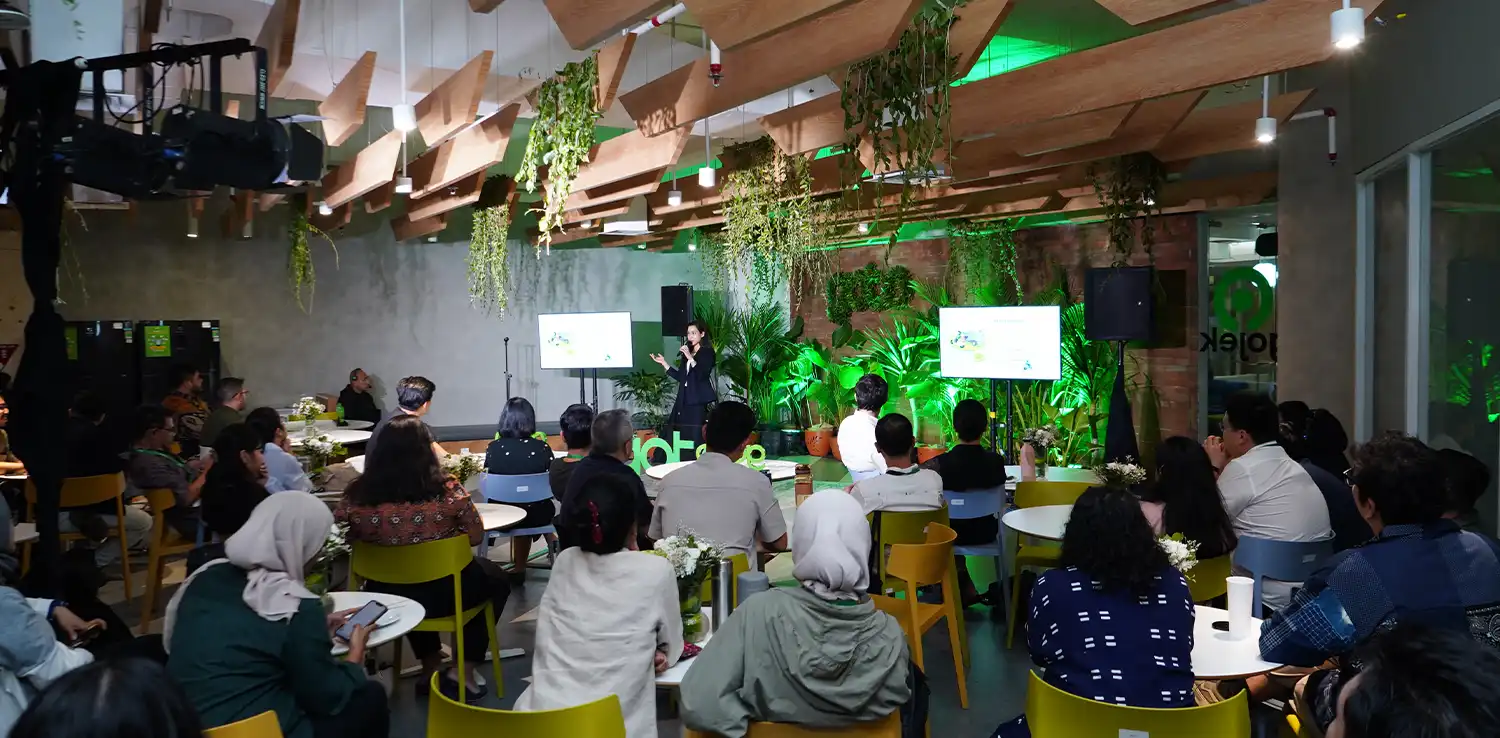An Interview with Tanah Sullivan, Head of Sustainability at GoTo

Tanah Sullivan, Head of Sustainability at GoTo | Photo: GoTo.
Can you tell us about your organization and your current role?
As GoTo Group‘s Head of Sustainability, I lead the development of the company’s sustainability strategy and initiatives across our diverse business units, comprising Gojek, Tokopedia, GoTo Financial, and GoTo Logistics. Everything we do aims towards advancing our Group’s Three Zeros commitments: Zero Emissions, Zero Waste, and Zero Barriers, which encompass all of the material ESG issues to GoTo and our ecosystem. We approach sustainability in terms of how to transition the company’s operations best to deliver quantifiable and measurable impact for the environment and stakeholders in our ecosystem. To achieve this, we are a small team centralized at the group level, focused on institutionalizing both sustainability knowledge and capabilities across all business and operational teams.
Our objective is not only to be a leading digital ecosystem in Southeast Asia but also a responsible and sustainable one; for us, these are mutually reinforcing aspects. By fostering innovation and collaboration, we can continue empowering progress for everyone, ensuring our digital economy is accessible, inclusive, and making a credible, measurable impact. Alongside the many partners and stakeholders we work with, we will continue to drive the sustainable growth of our ecosystem without compromising the well-being of our planet.
What are your corporate sustainability commitments and goals?
At GoTo, our north star across the group is our Three Zeros commitments and corresponding roadmaps. Everything we do is to ensure our company operates and measures its progress in environmental and socioeconomic terms as much as we do financially.
For Zero Emissions, we have a few strategies:
- Transition our driver partners’ vehicles to 100% electric vehicles by 2030. To support this, we established a joint venture, Electrum, to accelerate the 2W EV ecosystem in Indonesia, and have targeted to scale up to 3,000 active EVs by the end of 2023. We are working with various stakeholders, including the government, to make purchasing EVs more affordable, and educate drivers and customers about the benefits of switching to EVs.
- Shift our company’s operations to renewable energy, and improve energy efficiency across our offices and worksites. Continue providing our consumers with features to help accelerate the increase in awareness as well as behavioral change. One example of this is our consumer-led feature, GoGreener Tree Collective, which plants trees to offset the carbon emissions from GoFood and GoRide or GoCar orders. The uptake of this feature by over a million of GoTo’s consumers organically demonstrates the shift in awareness to real behavioral change.
- Through our service GoTransit, we promote multimodal transportation options for consumers using public transport. This has resulted in both a reduction in emissions as well as costs for consumers.
For Zero Waste:
- Dilayani Tokopedia orders now use recycled material packaging. We have reduced the use of plastic fillers in the boxes, replacing them with recycled cardboard fillers. Many of our GoFood merchants no longer provide disposable cutlery and are switching to sustainable bags or food packaging.
- We initiated the #DariAksiKecil & Tokopedia Hijau campaign, as part of our efforts to eliminate waste going to landfills from our ecosystem. This campaign aims to encourage GoFood’s business partners & Tokopedia sellers to start implementing sustainable practices in their businesses through better waste management. We also published a guidebook for merchants to reduce excess packaging as well as providing tested, credible alternatives to replace existing packaging.
- Series of workshops for merchants on a range of topics, including how to manage and process used cooking oil (as well as providing pick-up services for used cooking oil via our partner Waste4Change), and how to introduce more environmentally friendly packaging with our partner Avani Co.
And for Zero Barriers:
- Build a diverse, equitable, and inclusive organization and ecosystem: Ensuring gender diversity across the organization, with a focus on leadership and technical functions. We have also launched year-round programming for employees with modules on a range of topics including leadership, skills development, and others.
- Improve accessibility for all: Launched color-blind contrast modes on the Gojek and Tokopedia apps, as well as the Tokopedia website to support sight for our color-blind customers. This complements the already existing dark mode in the GoPay app to provide a complete visually-inclusive experience for all the customer apps in the GoTo ecosystem. These modes have been designed following international accessibility standards from WCAG.
- Facilitate financial inclusion and sustainable livelihoods through our platform: Continuing our efforts to support our driver partners’ sustainable livelihoods, working with partners to provide non-predatory financial products and services, reduce drivers’ operational expenses and ensure more diverse opportunities for income generation.

What have been your most difficult challenges in achieving those goals?
GoTo, as the largest digital ecosystem in the country, operates across various business sectors. This presents complex challenges in how we best transition our operations to credibly respond to the material, environmental, and social challenges faced by us as a company and our stakeholders. Most of our environmental impacts are from indirect sources (such as from the operations of our partners, merchants, and consumers), which we cannot fully control. Therefore, one of the biggest challenges we face is how to best influence and convince stakeholders to shift to more sustainable practices and behavior changes, as well as how to test and integrate credible solutions, in line with global best practices, and contribute to our Three Zeros commitments.
What opportunities do you see to address those challenges?
We are solving it through collaboration across team members at different levels and different business units. Integrating sustainability commitments into every business operation shows that running a business sustainably is also good for cost efficiency and business operations. Aside from that we also collaborate with many third parties like jejak.in, UN Women, TBS Energi Utama, Pertamina, and many more to achieve our goals.
The good thing is that we have the right momentum now. We are seeing a shift in behavior among consumers in how they view sustainability, such as using the carbon offset feature which has reached more than 1 million users and planted 325 trees.
What are the ESG material (environmental, social, and governance) issues that your organization focuses on, and how do you integrate them into your corporate sustainability?
Based on our initial risk inventory, we decided to focus on three main areas: emissions, waste, and social barriers, which became our foundation to build our Three Zeros commitment.
We are taking a holistic approach to ESG and implementing these principles into our business instead of adding costs to achieve sustainability. We are a business first and foremost, therefore we look for ways to implement sustainability in a way that positively impacts the business.
We also implement best-practice ESG reporting and disclosures and are committed to being transparent and fully accountable for our sustainability efforts. We align with global reporting standards and use third-party auditors to ensure our disclosures are accurate, relevant, and in line with investor and market expectations.
How do you communicate your corporate sustainability strategy and initiatives to internal and external stakeholders?
We believe in fostering transparent and comprehensive communication channels to effectively convey our corporate sustainability strategy and initiatives to both internal and external stakeholders. Internally, we utilize town hall meetings and newsletters to engage our employees, ensuring they are well-informed and aligned with our sustainability goals.
Externally, our commitment to transparency is showcased prominently on our website, where stakeholders can access detailed information about our sustainability commitments and track our progress toward set goals. We also actively participate in speaking opportunities such as panels and webinars, providing a platform to share insights and engage in meaningful discussions with external audiences.

What were the most exciting initiatives and progress that you and your team have made in 2023?
In 2023, my team and I are thrilled to share significant progress in our sustainability initiatives across the three pillars of Zero Emissions, Zero Waste, and Zero Barriers. We achieved a major milestone in our commitment to Zero Emissions by obtaining validation from the Science Based Targets initiative (SBTi) for our net-zero target set for 2050. This recognition reinforces our dedication to reducing our carbon footprint and contributing to a sustainable future.
The SBTi defines and promotes best practices in science-based target setting, offers resources and guidance to reduce barriers to adoption, and independently assesses and approves companies’ targets. It is the gold standard when it comes to ensuring companies’ net-zero targets are credible and verifiable. Achieving SBTi’s validation of our targets is a testament to our commitment and ongoing efforts towards decarbonization, and our dedication to integrate sustainability into the way that GoTo Group operates and grows.
In addressing the challenge of Zero Waste, we introduced a more efficient logistic delivery from our Dilayani Tokopedia warehouse. The new system ensures that all packaging associated with purchases under Dilayani Tokopedia is crafted entirely from recycled materials. By embracing circular economy principles, we aim to minimize waste and promote responsible consumption within our ecosystem.
Additionally, under the Zero Barrier initiative, we launched inclusive features in both the Gojek and Tokopedia applications, designed specifically for users with color vision deficiency. This enhancement aligns with the recent GoPay application that was designed following international accessibility standards, ensuring that our platforms are user-friendly for individuals with diverse needs and abilities, fostering a more inclusive digital experience.
What are the lessons you learned from your sustainability efforts in 2023?
In reflecting on our sustainability efforts in 2023, I’ve gained invaluable lessons that underscore the dynamic nature of this journey. I’ve come to appreciate that progress in sustainability is not always linear; it involves navigating complexities and adapting to unforeseen challenges. Building a strong foundation is essential, emphasizing the need for comprehensive frameworks and strategies that can withstand fluctuations.
Moreover, I’ve learned to embrace the concept of incremental growth, recognizing that sustained positive impact often results from continuous small steps rather than sudden leaps. This perspective encourages a long-term commitment to sustainability, understanding that lasting change is a cumulative result of persistent effort and strategic adaptation over time.
What are your plans for your sustainability efforts in 2024?
In 2024, our commitment to sustainability remains unwavering as we persist in our pursuit of the Three Zeros Commitment – Zero Emissions, Zero Waste, and Zero Barriers. Building upon the foundation laid in previous years, our plans involve advancing and refining our sustainability initiatives to achieve an even greater impact. We are dedicated to further reducing our carbon footprint, exploring innovative solutions to minimize waste, and enhancing inclusivity in our digital ecosystem.
As part of our strategy, we will continually assess and improve our practices, collaborate with stakeholders, and leverage cutting-edge technologies to ensure that our sustainability efforts align with global best practices. By reinforcing our dedication to the Three Zeros Commitment, we aim not only to meet but exceed our sustainability goals, contributing to a more sustainable and equitable future for all.
If you were to share advice you learned in your role that may be helpful to your peers and sustainability practitioners around the world, what would that be?
In my role, I’ve garnered valuable insights that I believe could greatly benefit my peers and sustainability practitioners worldwide. Firstly, I’ve learned that collaboration is key to driving meaningful change. Engaging with diverse stakeholders, both internally and externally, fosters a holistic approach to sustainability, leveraging collective expertise and resources for more effective outcomes.
Another crucial lesson is the importance of integrating sustainability into the core business functions rather than treating it as a set of standalone initiatives. By seamlessly incorporating sustainable practices into everyday operations, businesses can reduce costs and enhance long-term resilience and competitiveness.
Importantly, in the realm of sustainability, there’s no competition; we’re all aiming toward the same goal of creating a better and more livable planet for future generations. This perspective encourages open sharing of best practices, fostering a collaborative global community working collectively towards a sustainable and responsible future.


 Strengthening Resilience amid Growing Dependence on Space Infrastructure
Strengthening Resilience amid Growing Dependence on Space Infrastructure  Indian Gig Workers Push Back Against 10-Minute Delivery Service Strain
Indian Gig Workers Push Back Against 10-Minute Delivery Service Strain  Call for Governance: Grassroots Initiatives Look to Scale Efforts to Conserve Depleting Groundwater
Call for Governance: Grassroots Initiatives Look to Scale Efforts to Conserve Depleting Groundwater  Integrating Environment, Climate Change, and Sustainability Issues into Education Systems
Integrating Environment, Climate Change, and Sustainability Issues into Education Systems  Finally Enforced: Understanding the UN High Seas Treaty
Finally Enforced: Understanding the UN High Seas Treaty  Risks and Opportunities of Submarine Communication Cables for Sustainable Development
Risks and Opportunities of Submarine Communication Cables for Sustainable Development